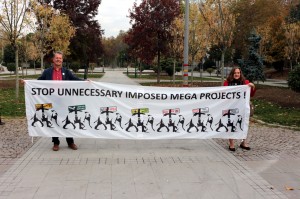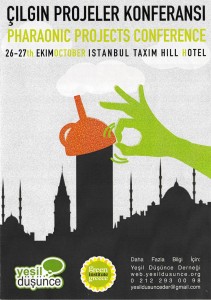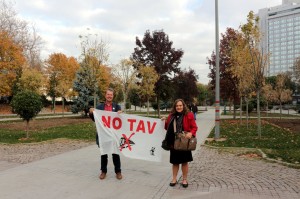Il PresidioEuropa No TAV, in rappresentanza del Forum contro le Grandi Opere Inutili e Imposte, ha partecipato con una delegazione alla Conferenza sui Grandi Progetti Faraonici organizzata dal 26 al 27 ottobre a Istanbul da Yeşil Düşünce Derneği, Turchia (Associazione Pensiero Verde) e Green Institute, Grecia.
Yeşil Düşünce Derneği (Associazione Pensiero Verde) e Kuzey Ormanlari Savunmasi (Difesa delle Foreste Settentrionali) hanno raggiunto il Forum contro le Grandi Opere Inutili e Imposte.
ISTANBUL, UNNECESSARY IMPOSED MEGA PROJECTS EXAMINED FROM 26 TO 27 October 2013.
The PresidioEuropa No TAV, representing the Forum against the Unnecessary Imposed Mega Projects, participated with a delegation to the Conference on Pharaonic Projects organized from 26 to 27October in Istanbul by Yesil Düşünce Dernegi, Turkey (Association of Green Thought) and Green Institute, Greece.
Yeşil Düşünce Dernegi Association and Kuzey Ormanlari Savunmasi (Defence of the Northern Forests) have reached the Forum against the Unnecessary Imposed Mega Projects.
Striscione Stop Unnecessary Imposed Mega Projects e bandiera NO TAV nel Gezi Park, Istanbul.
Stop Unnecessary Imposed Mega Projects banner and No TAV Flag in the Gezi Park, Istanbul.
 La relazione introduttiva in inglese è qui:
La relazione introduttiva in inglese è qui:
“La Costruzione del Forum contro le Grandi Opere Inutili e Imposte: una necessità storica”
Here the keynote speech:
“The Construction of the Forum against Unnecessary Imposed Mega Projects: An Historic Necessity” by Paolo Prieri
Istanbul 26.10.2013 Keynote Speech Pharaonic Projects Conference
Dear Friends, It is certainly very exciting to be here with you in Istanbul, a city whose name has resonated around the world this year as a symbol of the will and action of citizens to take charge of their future.
I am here to represent the Forum against Unnecessary Imposed Mega Projects, an international network of communities across Spain, France, Italy, the UK, Germany, Romania, Morocco, and beyond.
I would first like to thank the organizers for inviting me, both personally and on behalf of the organizations that make up the Forum.
My presentation aims to give you some information on the nature of Unnecessary Imposed Mega Projects, on why we must commit ourselves to saying STOP Unnecessary Imposed Mega Projects and encourage you to reflect on this paradigm of modernity and progress at full speed.
Movements and associations that collaborate in the Forum against Unnecessary Imposed Mega Projects actively oppose the imposition of massive infrastructure projects such as the HS2 rail scheme in the UK, the new Lyon-Turin rail line, the airport of Notre-Dame-des-Landes, the Stuttgart 21 train station, the tunnel under the fixed Fehmarn Belt link, the Bordeaux-Spain high-speed train, the tunnel under Old Florence and more.
The projects that we oppose are:
Unnecessary because they do not meet the real needs of the populations but instead divert vital public funds to mega schemes that are first and foremost about generating private mega profits,
and Imposed because citizens are excluded from real influence in both the analysis of the transport problem, and in the democratic identification of ways to address that.
More here: Istanbul 26.10.2013 Keynote Speech Pharaonic Projects Conference
The Waters of Istanbul
The No TAV movement at the Pharaonic Projects Conference- Çılgın ProjelerKonferansi
by Lisa Ariemma
Turkey is like the waters of Istanbul: an encounter of different worlds that co-exist and interact. The slightly salty Black Sea’s water collects the fresh water of rivers like the Danube and flows through the Bosphorous into the saltier Marmara Sea, then mixing with the water of the Mediterranean. That point of convergence, where these different bodies of water meet, is complicated to navigate but rich with sea life. In fact, in the west part of the city, on Galata Bridge over the Golden Horn, there are fishers day and night while ferries, fishing boats and tourist vessels pass beneath.
The city of Istanbul, with an official population of 13 million – but it’s said you can add another three to arrive at the real figure – is divided by the Bosphorous, a natural channel created over millennia uniting the freshwater lake to the salty sea. The western side is Europe and the eastern one Asia. The city is charged with energy reflecting this meeting of two worlds in its language, which is a mix of Arabic, Persian and Ottoman with a singular alphabet. It’s a culture that unites different religions, foods and music resulting in a unique fusion.
Last summer, Gezi Park, and Taksim Square which surrounds it, captured headlines around the world for the citizen-led demonstrations taking place beneath the shade of its trees: a unique struggle because of the diversity of the participants – from agnostic students to elderly Islamists and from environmentalists to soccer fans. The people of Istanbul resisted for more than two weeks to protect one of the few parks in this metropolis. In the face of police violence, they tried to stop a project for the construction of a shopping centre, demonstrating against a State convinced of a choice which would have transformed this little oasis into a block of cement.
The park, which has benches beneath its sprawling trees on the outer sides and a colourful playground in the middle, can be crossed in just a few minutes, and yet, it has become a symbol of the struggle against the privatization of public space. In the end, normal people were able to stop Prime Minister Recep Tayyip Erdoğan, the promoter of the project. In front of the park, his imposing image hangs from the rooftop of an East-German-style building, covering two thirds of its height. Two enormous Turkish flags hang at either side of his likeness.
The park occupation set off a string of demonstrations across the country which ended last July when a court decision blocked the Gezi Park project. On the wave of this success, the Pharaonic Projects Conference was organized and held in a hotel in front of the park, from October 26-27, by Turkey’s Yeşil Düşünce Derneği (Green Thought Association) and the Green Institute of Greece.
The meeting brought together local realities that shared their stormy struggles against Unnecessary Imposed Mega Projects (UIMP). After opening remarks from representatives of the Turkish and French Green Parties and Germany’s Die Linke party, the conference began with the keynote speaker from the Presidio Europa Committee of the No TAV movement in Susa Valley, Italy, who spoke about UIMP. He was followed by a presentation on the geographical identification of all the infrastructure projects in Turkey, the No TAV high-speed freight railway project, the nuclear power plant near Belene, Bulgaria, and the struggle against gold mines in Roşia Montană, Rumania.
The UIMPs in Istanbul, explained in detail, would ensure the “cementification” of the green space that remains around the city. A large part of the food that feeds this metropolis grows in the areas of a fragile ecosystem which risks being destroyed by a third airport, a third bridge over the Bosphorous and, certainly the most devastating, a marine channel parallel to the Bosphorous.
Notwithstanding the different contexts of the various projects, there were guiding, recurrent themes that are global: initiatives imposed from above without citizen participation, spending public money for the benefit of private enterprises and the destruction of the commons.
Turkish journalists from the most well-known media groups, as well as young freelancers, recounted their difficulties in providing objective news about unnecessary imposed mega projects without interference. The dilemma regarding mass media objectivity was cited as one of the greatest challenges facing all participants at the conference.
Later in the evening, Istiklal Caddesi (Independence Avenue), which begins at Taksim Square and continues to the area near the medieval Galata Tower, is full of people. Its 1.4 kilometres become a river of hundreds of thousands of people. A small old-fashioned red tram follows its route parting the crowds down the middle. Among the street musicians is a young man playing the Turkish version of the bagpipes, its bag made of black velvet covered in colourful designs, while a group of young people dances around him in a circle. It is a young populace that is sitting in the bars down the side streets and perhaps will be found the next morning selling wares at the Grand Bazaar.
The energy of the streets of Istanbul infected the conference room and through the exchange of experiences, strategies and alliances with organizations like Bankwatch and Re:Common, friendships were formed and concrete partnerships created. The organization Defence of the Northern Forests in Istanbul joined the Stop UIMP network, broadening the rings in the water. Along with the No TAV movement, the network includes groups such as Kein Stuttgart 21 in Germany, Stop HS2 in the UK, Aéroport Non! in Notre-Dame-des-Landes, France and Stop TGV! Tanger – Casablanca in Marocco.
In the meantime, in the nearby Cihangir neighbourhood, a citizen takes care of the numerous stray cats leaving a bowl of water and dried food on the sidewalk. That small act of humanity symbolizes the spirit of the meeting. New York City’s Zuccotti Park is very small … and yet it helped us understand that a simple local act can have a global resonance. Notwithstanding the diversity of the struggles presented and discussed before that small Istanbul park, a common desire was revealed that the interacting local voices become a global message through sharing among peoples … much like the waters of Istanbul.
Lisa Ariemma is a journalist and activist with the No TAV movement. She attended the Pharaonic Projects Conference (Çılgın ProjelerKonferansi).
L’Associazione Pensiero Verde è stata fondata nel 2008 a Istanbul al fine di promuovere il pensiero verde e politiche verdi, continuando il lavoro di progetti nazionali e internazionali.
Alcuni degli argomenti:
Green economy sostenibile, equa, per sostenere lo sviluppo dell’economia locale
Politica energetica verde, fonti di energia localmente autosufficienti per la generazione di un sistema di energia rinnovabili
Cambiamento climatico per la riduzione delle emissioni di carbonio da combustibili fossili per limitare rapidamente e radicalmente gli effetti del cambiamento climatico e gli sforzi di adattamento
Inquinamento di acqua, aria e suolo da cause chimiche, inquinamento biologico e nucleare, così come il rumore, la luce, e per sostenere la riduzione dell’inquinamento elettromagnetico e danni ambientali
Conservazione della natura, urbanizzazione, estrazione mineraria, deforestazione e degrado del territorio a seguito di attività agricole e industriali, al fine di evitare la distruzione di ecosistemi e di specie e per sostenere le lotte dei diritti naturali
Sostenibilità vita sostenibile nell’ambito dei diritti delle generazioni future con trasporti sostenibili, politiche sostenibili e autosufficienti della pesca ecreazione di infrastrutture necessarie ai cittadini e per l’agricoltura
Partecipazione, piani di gestione partecipativi e pratiche locali, come il coinvolgimento diretto dei cittadini nella formulazione delle politiche che li riguardano
Democrazia, pace, politica contro l’odio contro le donne e le persone LGBT che faticano a trovare lavoro, questioni sociali basate sui diritti, la consapevolezza e le attività di ricerca, la condivisione delle informazioni e l’organizzazione di programmi di formazione
http://web.yesildusunce.org/?page_id=386
çılgın Projeler Konferansi
 Conference on Pharaonic Projects, Istanbul, 26-27th October 2013
Conference on Pharaonic Projects, Istanbul, 26-27th October 2013
Stop Pharaonic Projects: Green Transformation is the solution
In response to the Global Crisis of 2008, which is still taking its toll especially in Balkan countries, governments in the region have resorted to plans for pharaonic projects which are environmentally destructive. From allowing gold-mining in protected areas to building nuclear power plants, from digging another channel next to the Bosporus to constructing a 3rd Bridge over the Bosporus at the expense of millions of trees, these projects clearly put enormous strains on the already fragile ecosystems, not only in the country where these projects will take place but in neighbouring countries as well, as is the case with Canal Istanbul Project (1).
Development-at-all-costs, in other words, short-sighted economic-growth oriented policies are one of the biggest threats to the well-being of societies today. Yet, governments deny the rights of citizens to participate in the decision-making process in the planning of these projects which have substantial consequences in peoples’ lives.
Nowadays, the technocratic “developmentalist” agenda and the lack of democracy go hand in hand. But it has been widely documented that the economic growth cannot be sustained in the absence of democracy.
In a two-day conference, we will outline the “unnecessary” and “imposed” projects in Turkey and in Southern European countries and share experiences gathered in movements against these projects.
Also, we will discuss possible ways to increase public participation in the decision-making processes and exchange ideas on how to strengthen environmental grass-roots movements.
We will demonstrate that the short-sighted economic-growth oriented policies are not the only option and Green Transformation policies are superior not only in their capacity to grow the economy and employment but also in their respect for nature and society.
The conference will gather experts, academics, politicians as well as activists from local popular movements together against pharaonic projects in Turkey and Europe to discuss the green way forward.
(1) http://www.theatlanticcities.com/jobs-and-economy/2013/06/could-istanbuls-protesters-halt-turkeys-controversial-canal-project/5787/
Green Thought Association-Turkey
Green Institute-Greece
Conference Venue: Taxim Hill Hotel
Programme
26th October, Saturday
10:00-10:15 Opening Remarks
10:15-10:40 Keynote Speech
Paolo Prieri, Unnecessary Imposed Mega Projects Network
“The Construction of the Forum against Unnecessary Imposed Mega Projects: An Historic Necessity”
10:40-11:00 Coffee Break
11:00-12:30 Panel
Overview of Mega Projects in Turkey and in Europe
Begüm Özkaynak, Cem İskender Aydın, Pınar Ertör Akyazı, Irmak Ertör, Boğaziçi University, Political Economy Working Group
Towards a better understanding of environmental conflicts in Turkey: A Mapping Exercise
Lisa Ariemma, The No TAV Movement (Stop High Speed Train), Italy
Codruta Nedelcu, Association ARIN, Romania
Daniel Popov, Bankwatch and Centre for Environmental Information and Education, Bulgaria
George Bilionis, Green Party of Greece
12:30-13:30 Lunch Break
13:30-14:15
The case of Canal Istanbul: A scientific counterview
Cemal Saydam, Hacettepe University
Ethem Gönenç, Istanbul university
14:15-15:45
Urban Transformation in the light of Mega Projects in Turkey
Cihan Baysal Uzunçarşılı
Çare Olgun Çalışkan, Northern Forests Defence Platform
Uğur Dündar, Mimar Sinan University
Korhan Gümüş, Taksim Platform
15:45-16:00 Coffee Break
16:00-18:00
Panel and Discussion: Developmentalist Agenda and Green Responses
Cengiz Aktar, Bahçeşehir University, Journalist , YSGP CG member
Fikret Adaman and Bengi Akbulut, Boğaziçi University, Political Economy Working Group
Haluk Levent, Galatasaray University, YSGP CG member
Ahmet Atıl Aşıcı, Istanbul Technical University, Greens and Left for the Future Party
Sedat Kalem, WWF-Turkey
27th of October, Sunday
Venue: Taxim Hill Hotel
10:00-10:30 Keynote Speech
How to involve public in the decision making process? EU’s Citizens’ Initiative Example
Olga Kikou, Green Party-Greece, Green Institute Greece
10:30-12:00
Panel and Forum: What we can do to stop environmentally destructive projects?
Hande Atay, Lawyers for Environment, Ecology Collective Turkey
Yakup Şekip Okumuşoğlu, Lawyers for Environment
Oya Ayman, Greens and Left For the Future Party
Murat Güvenç, Istanbul Şehir University
Fidanka Bacheva-McGrath, CEE Bankwatch Network
12:00-13:00 Lunch Break
13:00-15:30 Panel
Mega Projects and Environmental Journalism in Turkey
Moderator: Pelin Cengiz, Journalist
Mehveş Evin, Milliyet
Gürhan Savgı, Zaman/Aksiyon
Utku Zırığ, IMC TV-Yeşil Bülten
Filiz Yavuz, Freelance Journalist
Seçkin Ürey, Habertürk
Güray Öz Tekin, Cumhuriyet
Serkan Ocak, Radikal
Yonca Poyraz Doğan, Today’s Zaman
15:30-15:45 Coffee Break
15:45-16:30
General Evaluation and Concluding Remarks
End of Conference
Organization Committee
Green Thought Association in collaboration with Green Institute, Greece.
Green Thought Association
Katip Mustafa Çelebi Mh. Hasnun Galip Sk. Pembe Çıkmazı No:9 Kat: 3
Beyoğlu-İstanbul/Turkey
Tel/Fax: 00 90 212 293 00 98
E-mail: yesildusunceder@gmail.com
Contact Persons:
Ahmet Atıl Aşıcı ahmetatil@yahoo.com and Olga Kikou okikou@gmail.com
Organization Team:
Gizem Kastamonulu (TR) gizemkastamonulu@gmail.com
Asena Ulus (TR) asena.ulus@gmail.com
Ercüment Gürçay (TR) ercumentgr@gmail.com
Venetia Chatzi (GR) venchatzi@gmail.com

